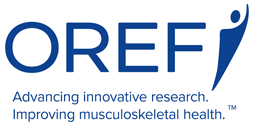
Research Grant and Award Programs
Requests for Applications (RFAs) for OREF grant opportunities will be released following the schedule(s) below. Please note that dates are subject to change due to availability of funds. Changes and exceptions to the schedule(s) below will be noted on this page, so please check back often. To be notified of all grant opportunities as their application period opens, sign up for email and follow us on social media.
Additional grants will be listed as RFA dates are confirmed. Bookmark this page or sign up for email updates to be notified as grants become available and deadlines approach. Please note: any changes to RFA release dates will be reflected on this webpage.

| Program | Amount | RFA Release Date | LOI Deadline | Application Deadline |
|---|---|---|---|---|
| OREF Career Development Grant | $300,000 | 7/10/2025 | 8/11/2025 | 10/14/2025 |
| OREF New Investigator Grant | $50,000 | 7/10/2025 | 8/11/2025 | 10/14/2025 |
| OREF Multimodal Musculoskeletal Perioperative Pain Management Grant in collaboration with AANA Foundation | $92,500 | 7/10/2025 | 8/11/2025 | 10/14/2025 |
| OREF/John W. Brown Early-Stage Investigator Enabling Technologies in Musculoskeletal Care Research Grant | $100,000 | 7/10/2025 | 8/11/2025 | 10/14/2025 |
| Mentored Clinician Scientist Grant (Must have been awarded a "K" award to apply) | $20,000 | 7/10/2025 | N/A | 10/14/2025 |
| Program | Amount | Release Date | LOI Deadline | Deadline |
|---|---|---|---|---|
| OREF Clinical Research Award | $20,000 | 6/23/2025 | N/A | 8/31/2025 |
| ORS/OREF Distinguished Investigator Award | Honorary Award | N/A | N/A | 9/12/2025 |
Grant Forms
Looking for forms related to your OREF grant? Click here to access all forms.
OREF Grant and Award Portfolio
OREF supports new and experienced investigators with a broad range of grant and award programs that recognize the unique needs of both the investigator and the field. The programs below are expected to be offered in the future, pending funding availability. For currently available opportunities, click the Open Grants and Awards tab. For questions, please contact the OREF Grants team at grants@oref.org.
Career Development Grant
Provides $300,000 in funding over three years to encourage investigators to commit to scientific research. Research may be basic, translational, clinical and/or health services.
New Investigator Grant
Provides $50,000 to advance the scientific training of the next generation of orthopaedic physician-scientists with seed and start-up funding for promising research projects. Residents fellows, and orthopaedic surgeons having completed formal training within the last four years may apply.
OREF Resident Clinician Scientist Training Grant
Provides $20,000 to prepare residents for a career with research as a major component.
OREF Resident Research Project Grant
Provides $5,000 in funding to residents who are interested in research. Please note that these grants now require a Letter of Intent. They are offered twice each year, but you may submit only one application per grant year. Please apply during the time frame that most closely aligns with your research rotation in the labs.
OREF Mentored Clinician Scientist Grant
Provides $20,000 to promote the development of new clinician scientists who have demonstrated success as both a clinician and a researcher. This grant allows investigators to spend dedicated time in research for a period of up to five years to develop a long and productive career in academic surgery.
OREF Clinical Research Award
Awards $20,000 in recognition of outstanding body of clinical research related to musculoskeletal disease or injury.
OREF/AAOS Injectable Orthobiologics Knee Osteoarthritis Research Grant
Provides $50,000 in funding for proposals focused on the broad area of injectable orthobiologics for the treatment of knee osteoarthritis.
OREF/Goldberg Arthritis Research Grant
Provides $50,000 in seed and start-up funding for promising research projects that address issues related to the treatment of arthritis with an emphasis on arthroplasty.
OREF/ASES/Rockwood Clinical Shoulder Research Grant
Provides $50,000 in funding and encourages new investigators to conduct research in the area of shoulder care.
OREF/MTEC Solutions to Accelerate Return-to-Readiness following Musculoskeletal Injuries Grant
Provides funding for investigator-initiated research proposals focused on a broad area of musculoskeletal research focused on faster recovery through the regeneration and repair of soft tissue, nerves and muscle following acute injury.
OREF Musculoskeletal Research Grant/Acute Injury in Collaboration with the Medical Technology Enterprise Consortium (MTEC)
Provides funding for a broad area of musculoskeletal research focused on faster recovery through the regeneration and repair of soft tissue, nerves and muscle following acute injury.
OREF Prevention of Musculoskeletal Youth Sports Injuries Research Grant in Honor of James R. Andrews, MD
Provides funding for new investigators conducting clinical and/or social research on the prevention of musculoskeletal youth sports injuries.
OREF/AANA Foundation Multimodal Musculoskeletal Perioperative Pain Management Research Grant
Provides $50,000 in funding for research focused on the broad area of perioperative musculoskeletal pain management.
OREF Osteoarthritis Research Grant
Provides $50,000 in funding for research that aims to help us better understand how to prevent and treat osteoarthritis, one of the most common causes of disability in adults.
OREF/MTF Biologics Research Grant
Provides $100,000 ($50,000 per year for two years) for research focusing on the science of biologic—reconstruction, bone regeneration, transplantation—allografts, including stem cells for graft transplantation.
Sports Medicine Multicenter Research Grant with funding support from The Aircast Foundation
This collaboration with AOSSM and AAOS provides funding for research focused on the broad area of sports medicine multicenter research trials.
OREF Etiology of Hip Osteoarthritis Grant in Honor of William H. Harris, MD
Provides $250,000 over two years for investigator-initiated research proposals focused on the etiology of hip osteoarthritis.
The OREF Impact of Regulatory Policies on the Patient-Physician Relationship Research Grant in Honor of Sigvard Hansen, MD
Provides $75,000 in funding for proposals that explore the impact of regulatory practices on the patient-physician relationship. The proposal should examine how and to what extent the burden of additional required documentation impacts the amount and quality of time a physician has available to focus on direct patient care.
OREF/OTA Trauma Research Grant with funding support from Arthrex
Provides $150,000 for investigator-initiated research proposals focusing on Orthopaedic Trauma that investigates innovative strategies for operatively managing ankle fractures in the setting of compromised bone or soft tissue or metabolic challenges likely to increase risk of complications.
OREF/JRGOS Diversity, Equity, Inclusion and Disparities in Orthopaedic Health Care Research Grant with funding support from the Zimmer Biomet Foundation
Provides $150,000 in funding over two years to stimulate clinical research and provide funding for promising studies to find solutions to problems of diversity, equity, inclusion, and disparities in orthopaedics.
ORS/OREF Travel Grants in Orthopaedic Research Translation
Provide a $500 honorarium to be used toward travel to the ORS Annual Meeting. These grants recognize clinician scientists and clinical investigators in the early stages of their careers who have played a key or leading role in an original research project in clinical or translational medicine, and who have demonstrated excellence in training and a commitment to orthopaedic research.
Shimomura/OREF/International Society of Orthopaedic Surgery & Traumatology (SICOT) Travel Awards
Provides $1,500 for a SICOT member with a specific travel objective and a global objective for future research who has completed studies focusing on health care policy, clinical outcomes or translational research having immediate impact.
OREF Michael P. Kelly Sr. Leadership Fellowship Program
The one-year program is designed to aid and develop leadership skills in the orthopaedic resident's research career path. The curriculum focuses on leadership development, including cultivating the attributes of integrity, selflessness, decisiveness, organization, benevolence, vision, communication, and innovation. The participant selection process will prioritize women and underrepresented minorities.
